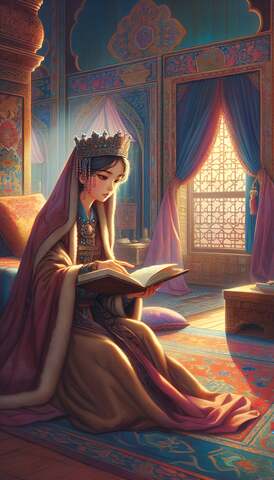
东汉时期,有一位叫做明德的皇后。
她的父亲是伏波将军马援。
在父亲去世后,年幼的她就能独自处理家里的事情了。
十三岁那年,她被选入皇宫,开始服侍皇后。
她对待人十分谦虚有礼,品行端正且才华出众,因此受到了皇帝的喜爱。
汉明帝刘庄即位后不久,就册立马氏为皇后,史称明德皇后。
因为明德皇后没有自己的孩子,所以汉明帝决定立贾氏的儿子为太子,并让明德皇后来抚养他。
明德皇后对太子照顾得无微不至,就像对待自己的亲生儿子一样。
她非常喜欢读书,经常读《春秋》、《楚辞》和《周礼》等历史书籍。
汉明帝也会让她看一些奏章,但明德皇后并不干涉朝政。
汉明帝去世后,太子继承了皇位,成为了汉章帝。
他对抚养自己长大的明德皇后非常尊敬,不仅尊称她为太后,还想封赏她的兄弟们。
一些大臣也上书请求明德皇后答应这个请求。
但是,明德皇后不同意。
她说:“我知道我的兄弟们并没有为国家做出什么重要的贡献,不能无缘无故地接受封赏。”
为了表达自己的决心,明德皇后下了一道诏书。
她说:“我身为一国的皇太后,穿着粗布杂丝做的衣裙,吃的饭菜也不追求美味,身边的侍者也没有佩戴熏香饰品。前几天我路过濯龙门的时候,看到很多亲戚朋友来探望我,人潮络绎不绝,像车水马龙一样热闹。我没有生气责备他们,只是停止给他们生活上的补助,希望他们能自愧而改过。”
“车水马龙”这个成语就是从这里演变而来,意思是车流如流水般连续不断,马匹多得像游动的龙一样。
现在我们常用它来形容车马往来不断,场面热闹繁荣的情景。
During the Eastern Han Dynasty, there was an empress named Mingde.
Her father was General Fubo Ma Yuan.
After her father's death, the young girl could handle household affairs on her own.
At the age of thirteen, she was selected into the palace and began to serve the queen.
She treated people with humility and politeness, had a virtuous character, and was outstanding in talent, so she was favored by the emperor.
Shortly after Emperor Mingdi Liu Zhuang ascended the throne, he made Ma the empress, known as Empress Mingde.
Since Empress Mingde did not have any children of her own, Emperor Mingdi decided to establish Jia's son as crown prince and let Empress Mingde raise him.
Empress Mingde took care of the crown prince meticulously, just like her own son.
She loved reading very much and often read historical books such as 'Spring and Autumn Annals', 'Chu Ci', and 'Zhou Li'.
Emperor Mingdi also allowed her to see some memorials, but Empress Mingde did not interfere in politics.
After Emperor Mingdi passed away, the crown prince succeeded to the throne and became Emperor Zhangdi.
He held great respect for Empress Mingde who raised him, not only addressing her as Empress Dowager but also wanting to reward her brothers.
Some ministers also submitted a memorial requesting Empress Mingde to agree to this request.
However, Empress Mingde disagreed.
She said, 'I know that my brothers have not made any significant contributions to the country and should not receive rewards without reason.'
To express her determination, Empress Mingde issued an edict.
She said, 'As the empress dowager of a country, I wear clothes made of coarse cloth and silk, eat simple meals, and my attendants do not wear perfumed ornaments. A few days ago, when I passed by Zhumalong Gate, I saw many relatives and friends coming to visit me, the crowd was bustling like a flowing river. I did not get angry or blame them, I simply stopped giving them living subsidies, hoping they would feel ashamed and change their ways.'
'Busy streets like a flowing river' is derived from this story, meaning continuous traffic flow like a river, and horses as numerous as swimming dragons.
Now we commonly use it to describe scenes of continuous traffic and horse-drawn carriages, lively and prosperous.